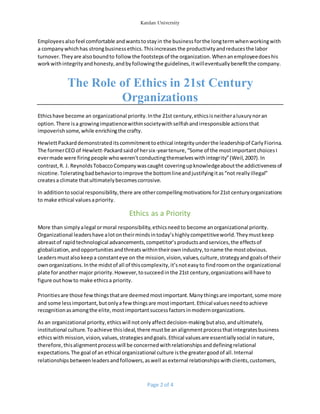Role of Ethics in Organization
- 2. Kardan University Page 1 of 4 Importance of Business ethics in an organization Businessethicscanbe denotedaswrittenorunwrittencodesof morals,values,andprinciples That governsactionsanddecisions inacompany.In the businessworld,standardsare setfor determininggoodandbadbehavioranddecision-making.Businessethicsisabroad topic,covering everythingfromcorporate governancetocorporate social responsibility. Businessethicsisasubjective term.However,itiseasytoidentifyunethical businesspracticesinan organization,suchasemployingchildlabor,takingbribes,orillegallyusingcopyrightedmaterials. Whenethical guidelinesare followed,trustisdevelopedbetweenthe employeesandmanagement,as well asthe publicandthe corporation.Thus,businessethicsleadstoamore productive workplace. Importance of Business Ethics Everycompanyshouldhave theirownmoral principlesandguidelines.Followingbusinessethicshas more benefitsthanyouthink.Itwill helpyoutokeepandattract employees,customers,andinvestors. For example,considerthatyouare an ŌĆ£energydrinkŌĆØmanufacturingcompanyandyouŌĆÖve proclaimedon the labelsandadvertisementsthatyoudonŌĆÖtaddanypreservativestothe drink,then youshouldadhere to the claimsyouŌĆÖve made.If youdisobeyyourclaimsandsell the productbyaddingpreservatives,then it isconsideredasunethical businesspractice.Itwill deteriorate yourbrandandeventually,youwilllose trust fromthe customers.Italso damagesthe reputationandkeepawaythe stakeholders.Therefore, followingbusinessethicsisveryimportant. Reputationisone of the mostimportantassetsof a companyandit isalso one of the most difficulttasks to rebuildonce itislost.You will startbuildingagoodreputationwithconsistentethical behavior. Potential Investorsandshareholdersare likelytogetattractedtothe companieswhichadhere totheir moral guidelinesandpromisestheyŌĆÖve made;thiskeepsthe companyŌĆÖsshare price high. To retaina positive reputationandimage,businessesmustbe committedtooperatingonanethical foundationasitrelatestorespectingthe surroundingenvironment,treatmentof employees,andgood marketpracticesintermsof customertreatmentandprice.
- 3. Kardan University Page 2 of 4 Employeesalsofeel comfortable andwantstostayin the businessforthe longtermwhenworkingwith a companywhichhas strongbusinessethics.Thisincreasesthe productivityandreducesthe labor turnover.Theyare alsoboundto followthe footstepsof the organization.Whenanemployeedoeshis workwithintegrityandhonesty,andbyfollowingthe guidelines,itwilleventuallybenefitthe company. The Role of Ethics in 21st Century Organizations Ethicshave become an organizational priority.Inthe 21st century,ethicsisneitheraluxurynoran option.There isa growingimpatiencewithinsocietywithselfishandirresponsible actionsthat impoverishsome,while enrichingthe crafty. HewlettPackarddemonstrateditscommitmenttoethical integrityunderthe leadershipof CarlyFiorina. The formerCEO of Hewlett-Packardsaidof hersix-yeartenure,ŌĆ£Some of the mostimportantchoicesI evermade were firingpeople whoweren'tconductingthemselveswithintegrityŌĆØ(Weil,2007).In contrast,R. J. ReynoldsTobaccoCompanywascaught coveringupknowledgeaboutthe addictivenessof nicotine.Toleratingbadbehaviortoimprove the bottomlineandjustifyingitasŌĆ£not reallyillegalŌĆØ createsa climate thatultimatelybecomescorrosive. In additiontosocial responsibility,there are othercompellingmotivationsfor21st centuryorganizations to make ethical valuesapriority. Ethics as a Priority More than simplyalegal ormoral responsibility,ethicsneedto become anorganizational priority. Organizational leadershave alotontheirmindsintodayŌĆÖshighlycompetitiveworld.Theymustkeep abreastof rapidtechnological advancements,competitorŌĆÖsproductsandservices,the effectsof globalization,andopportunitiesandthreatswithintheirownindustry,toname the mostobvious. Leadersmustalsokeepa constanteye on the mission,vision,values,culture,strategyandgoalsof their ownorganizations.Inthe midstof all of thiscomplexity,itŌĆÖsnoteasyto findroomonthe organizational plate foranothermajor priority.However,tosucceedinthe 21st century,organizationswill have to figure outhowto make ethicsa priority. Prioritiesare those fewthingsthatare deemedmostimportant.Manythingsare important,some more and some lessimportant,butonlyafewthingsare mostimportant.Ethical valuesneedtoachieve recognitionasamongthe elite,mostimportantsuccessfactorsinmodernorganizations. As an organizational priority,ethicswill notonlyaffectdecision-makingbutalso,andultimately, institutional culture.Toachieve thisideal,there mustbe analignmentprocessthatintegratesbusiness ethicswithmission,vision,values,strategiesandgoals.Ethical valuesare essentiallysocial innature, therefore,thisalignmentprocesswill be concernedwithrelationshipsanddefiningrelational expectations.The goal of an ethical organizational culture isthe greatergoodof all.Internal relationshipsbetweenleadersandfollowers,aswell asexternal relationshipswithclients,customers,
- 4. Kardan University Page 3 of 4 vendorsandthe communityare all prized.Asa result,people are treatedwell consistentlyandan ethical culture emerges. Values-Based Culture In the 21st century,ethicsisneitheraluxury noran option.More than competence,experience, intelligence anddrive,peopleatall levelsof anorganizationneedethical values.AccordingtoKidder (2001), ŌĆ£The principle taskof thisdecade isthe creationandnurturingof a values-basedculture.ŌĆØDue to the extensiveamountof time people spendatwork,muchof that nurturingmusttake place inthe businessenvironment. RushworthM. Kidderisthe founderandpresidentof the InstituteforGlobal Ethics,anorganization whose researchhasidentifiedfourkeyfactorsincreatinga values-basedculture.These factorsinclude: ’éĘ Shared core values Accordingto Kidder(2001), there are five core valuesfoundinsome formineveryculture worldwide.Theyare honesty,respect,responsibility,fairnessandcompassion.A values-based culture will make these core valuesthe drivingforce indecision-making. ’éĘ Common language Employeesneedalanguage of ethicsthatallowsthemtocommunicate readilyandcomfortably aboutissuesthatare typicallysensitive anddifficulttodiscuss.Effective ethicstrainingprograms provide the commonlanguage needed. ’éĘ Commitment at the top Ethicstrainingismeaninglesswithouttop-level executiveswhowalkthe talk.Whenleaders consistentlyrewardthosewhochoose todowhat isright,it helpstocreate an ethical culture more than anythingelse could. ’éĘ Moral courage Kidder(2001) describesmoral courage asŌĆ£the qualityof mindandspiritthatenablesone toface up to ethical dilemmasandmoral wrongdoingsfirmlyandconfidently,withoutflinchingor retreating.ŌĆØ Ethics,lifestyle andculture mustbecome sointerwoventhattheycannotbe separated.Together,they constitute howpeople relate toone anotherinthe home,the workplace andeverypartof society. Create Ethical Culture in Organization Define company ethics Everycompanyhas spokenandunspokenrulesabouthow toact withinacompany environment.Give lucidexplanationsaboutwhatisokayandwhat isnot okay.Thisincludesbehaviortowardsother employees,customers,andthe public.Sometimestheseguidelinesare differentfordifferent companies. Ensure that you have necessary tools
- 5. Kardan University Page 4 of 4 It isthe dutyof the Humanresource departmenttoensure thatthe employeesare equippedwith adequate toolswhich enablethemtobehave ethicallyinthe organization. Strengthen the Behavior You Want Strengtheningthe behaviorinanemployee isaneasytask.Offeringawardsandrecognitionisone of the bestwaysto encourage the ethical behavioryouwantto reinforce inanemployee.Tocreate a strong ethical culture inanorganization,there hastobe a constantcommunicationaboutethical valuesamong the members.Youcan alsospecificallyexplainaboutthe behaviorsyoudonotwantto inculcate Focus on building skills Create workshopswhichimprovethe ethical culture inthe company.Itisthe dutyof the organizationto buildanddevelopethical skillsamongthe membersratherthanjuststatingthe behaviorswhichyou encourage andbehaviorswhichyoudonot.Thisshouldalsodevelopethical behaviorandproblem- solvingskillsinanemployee.





